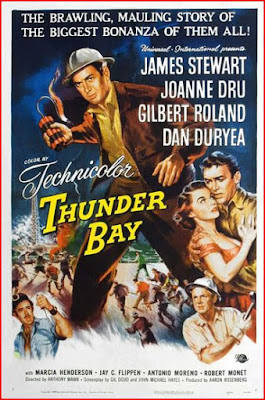The fourth collaboration between director Anthony Mann and star Jimmy Stewart is set in 1946 and thus doesn't get the admiring attention of their classic run of westerns, but it's probably the nearest thing to a western of their team-ups outside the genre. It has the same sort of driven Stewart hero the westerns have, though he has no vengeance agenda to drive him. Instead, Steve Martin -- no relation to the American journalist who covered Godzilla's rampage through Tokyo a few years later -- is a heroic if somewhat ruthless entrepreneur. Down to his last dime -- if that -- he and his sidekick Gambi (Dan Duryea) have to convince an oil baron (Jay C. Flippen) to finance the construction of an oil rig off the coast of Port Pleasant LA. Steve clearly knows his stuff but there's still something of the huckster, if not the con man, to him, but that hustling quality earns him the oil baron's sympathy. "You've never had the pleasure of gambling your last dollar on a dream," he chides his corporate bean-counter, recognizing a kindred risk-taker. Steve doesn't earn the trust of the locals so easily. They're shrimpers and worry about the oil riggers disrupting the shrimp beds. Worse, the educated daughter of one of the shrimpers (Joanne Dru) spreads the impression that oil workers are trash. She seems to speak from personal experience, but Gambi, a party animal, doesn't help the oil men's case by promptly stealing another shrimper's girl. They shouldn't worry, since Dan Duryea is pretty much a good guy for once, but the conflict continues to escalate as the shrimpers make repeated efforts to sabotage the drilling while Steve's backers run out of money and patience.
Thunder Bay arguably was ahead of its time in portraying a conflict between energy prospectors and locals concerned about the environmental impact of oil drilling, but as a product of the 1950s it predictably reconciles all conflicts, revealing a harmony of interests as the drillers actually make it easier for the shrimpers to harvest a rare, valuable catch. This is actually one of the most pro-oil films you'll probably ever see, since the writers found it necessary to have Steve defend his drilling with a speech bluntly announcing America's dependence on oil. Without it, he says, the country begins to die, including the shrimpers. That speech may give the film a retroactive camp quality, or worse, for the politically or ecologically sensitive, but it really only makes the film a document of its time, dating it relative to Mann and Stewart's more timeless westerns.
Take away the stark landscapes that give those westerns an outdoor-expressionist quality and for a while Mann looks like a more ordinary filmmaker. Thunder Bay doesn't really come to life until the oil rig is built, and then Mann takes every advantage of his new toy. The picture's visual highlight is a fight between Steve and one of the shrimpers, the man who lost his girl to Gambi, who tries to plant dynamite on the rig just as a hurricane bears down on the site. Mann and cinematographer William H. Daniels give the fight an elemental quality, making the most of his rain effects and the roiling waters below. They achieve something similar when the riggers have to stop a salt-water blow and, on a more exhilarating note, once the well comes in and an oil-soaked Stewart shrieks with joy. This may not be a western, but it's definitely not as tame as The Glenn Miller Story or Strategic Air Command. It's not as good as the westerns, either, but those who love the westerns may still like this one a bit.

No comments:
Post a Comment